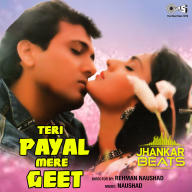Music has played an essential role throughout Naushad's life. As a youngster, he was mesmerized by the great qawwals and musicians that he heard at the annual fair in Barabanki. He spent countless hours sitting by the feet of a flute player from Bareilly, listening and absorbing what he heard. Securing a position with the small orchestra that accompanied silent films at the Royal Theater in Lucknow, he learned the techniques needed for composing effective background music for the cinema. He strengthened his skills through studies with Ustad Baban Khan and Ustad Yusuf Khan.
Despite his obvious passion for music, Naushad's father frowned on music as a career choice. Forced to decide between music and his father's wishes, he left home and headed for Bombay. Reaching the large city in 1937, he stayed briefly with an acquaintance at Colaba before moving to Dadar. Determined to break into the competitive world of film score composing, he slept on a footpath opposite the Broadway Theater and waited for an opportunity to arise.
Although he took a job assisting music director Ustad Jhande Khan, the film they worked on went unreleased and he soon found himself unemployed. A job at Ranjit Studio, assisting Khemchand, fared no better as he found that the musicians were highly undisciplined and refused to follow the direction of an assistant music director.
Resigning from his position at Ranjit studios, Naushad worked as an assistant to a series of music directors including A. R. Kardar and P. N. Madhok. His breakthrough came in 1941, when he became a full-fledged music director for Prem Nagar. His earliest success came with his symphonic soundtrack for the film #Baiju Bawra. Premiered in 1953 at the Broadway Theater, the soundtrack became a major hit. ~ Craig Harris, Rovi












